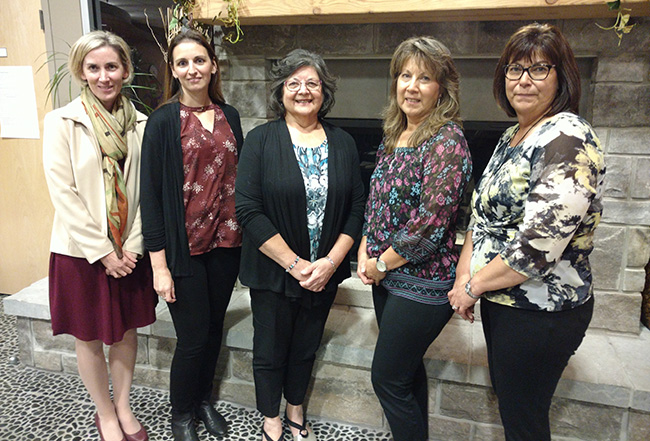New protocol with Sarnia-Lambton CAS and area First Nations

By Colin Graf
AAMJIWNAANG FIRST NATION – As the shadow of the Sixties Scoop and following dislocations looms over them, First Nation leaders here are moving closer to taking control of child welfare for their own families.
The signing of a new agreement between Aamjiwnaang, near the south-western Ontario city of Sarnia, with the local Children’s Aid Society marks the end of years of discussion and the start of a new relationship between the agency and community, leaders told residents at a public meeting recently.
The new protocol promises the Sarnia-Lambton CAS will consult with the First Nation on all matters involving its families and children, and that the community will participate in choosing any necessary placements for its children. If children must leave their homes, the agreement states they will remain in their community whenever possible, and if Aamjiwnaang children/youth are in CAS care, connections to their culture and community will be a priority. Citizens will also be involved in all planning and delivery of services to local families.
“This will help build the capacity of our community to look after our own children,” said Janice Rising, recently-retired program supervisor at Aamjiwnaang for Mnaasged Child & Family Services, an Indigenous agency providing offering family support, child and youth programming along with counselling and advocacy for families at risk. Completing this agreement is the end of around eight years of discussions and is “quite an accomplishment” in getting the approval of Chief and Council, she says.
The protocol means the CAS is ready to “give up our power and work as partners” with Aamjiwnaang, says the agency’s executive director Dawn Flegel. Just five years ago there was “huge over-representation” of Indigenous children in CAS care, she says. By working with First Nations representatives, the number has declined greatly – from close to 50 children down to just three today.”
The largest change will be that the CAS will inform the Band Representative much earlier in the child welfare process than ever before. The Representative or other official was only informed in the past when a child was to be removed from a home, “way too late,” says Flegel. “Consultation will happen now as soon as a case is referred to the CAS. While that procedure has been followed for a while, the new agreement enshrines it,” she says.
Child welfare workers at the First Nation used to find out after the fact that the CAS was helping “a whole bunch” of families, says Rising, when her own staff with Mnaasged could have also been lending a helping hand earlier on.
It’s essential for First Nations to start taking child welfare into their own hands, Anishinabek Grand Chief Patrick Madahbee told the meeting. “A duck is a duck, a goose is a goose, and an Anishinabe is an Anishinabe. Government agencies have tried to turn us into something else for too long,” he said, but the Aamjiwnaang agreement is part of a movement to take child welfare back into Anishinabek hands across the 40 nations. Relationships have improved a lot in recent years, with Children’s Aid Societies creating partnerships rather than exerting power, but much work remains, according to Madahbee.
He says the Anishinabek Nation Child Well-Being Law will be in place April 1, 2018 that will lay the groundwork for all Anishinabek First Nations to take the powers of Children’s Aid societies into their own hands. Negotiations are underway with the provincial and federal governments about both jurisdictional issues and monetary matters, to create a law that will replace Ontario’s Child & Family Services Act, he explains. “Children in need of help and protection need to be cared for in their own communities,” says Madahbee. “It’s different for us. These children are not our clients; they are our family.”
Power is starting to devolve from the Sarnia-area CAS into Indigenous hands, thanks to Mnaasged, a child welfare body that serves seven First Nations in the southwest. The agency has just been approved to take over the operation of foster care for children at; Aamjiwnaang, Kettle & Stony Point, Chippewa of the Thames, Munsee Delaware, Oneida of the Thames, and Caldwell First Nations. This change is a huge step toward transforming Mnaasged from a group that helps prevent problems for children in their homes into a full CAS, says Aamjiwnaang councillor and Mnaasged board member Sherri Crowley. She hopes the agency will receive that designation by 2019, a goal workers have been aiming for for over 10 years.
The change for Mnaasged is fully supported by the CAS, says director Flegel. The Sarnia-Lambton body’s workers prioritized their First Nations’ relationships five years ago, and she credits Janice Rising, who served on the CAS board, with “showing what consultation really means,” and how to share power, work as partners, and “to stop thinking we had all the answers,” she told the meeting.

